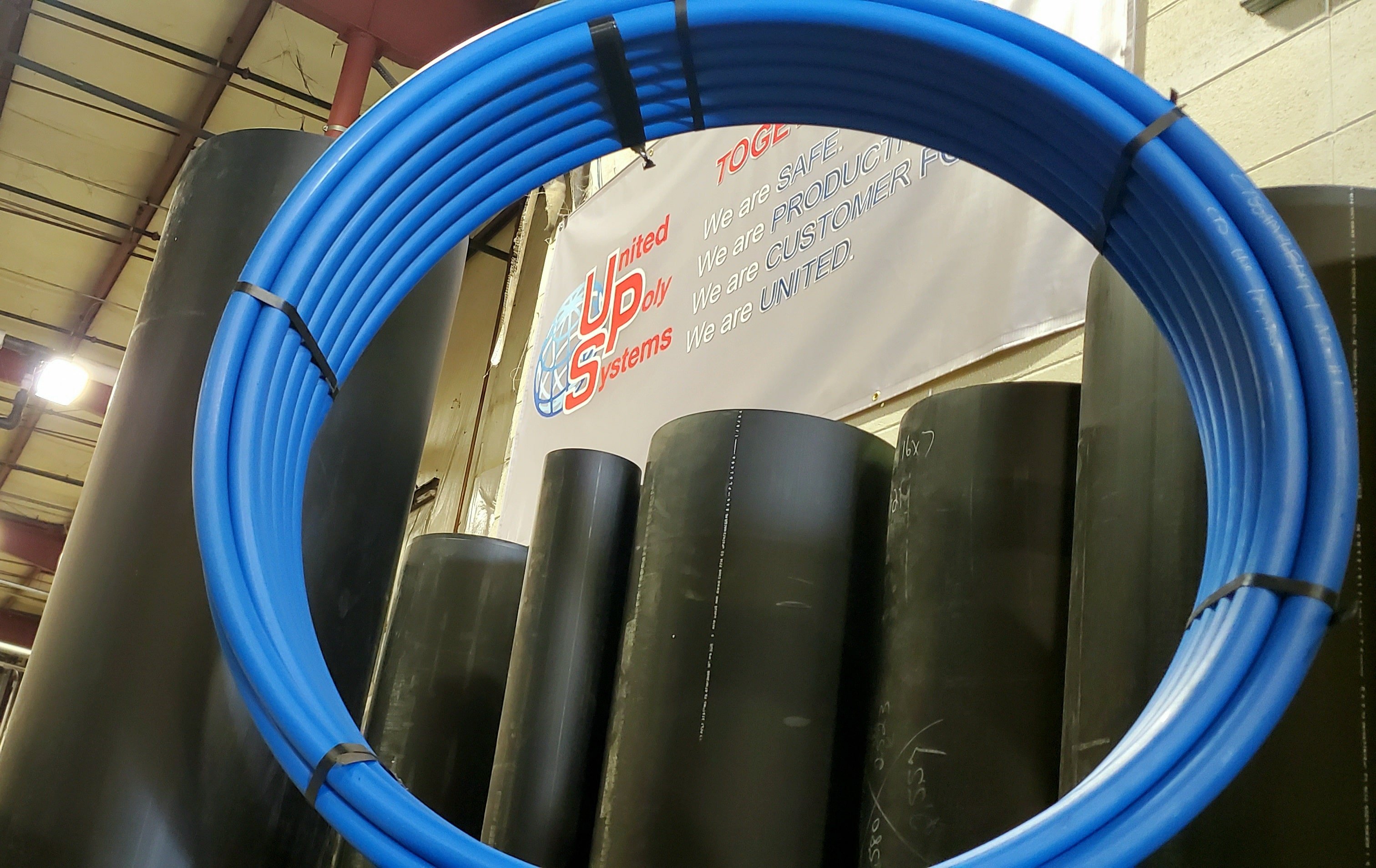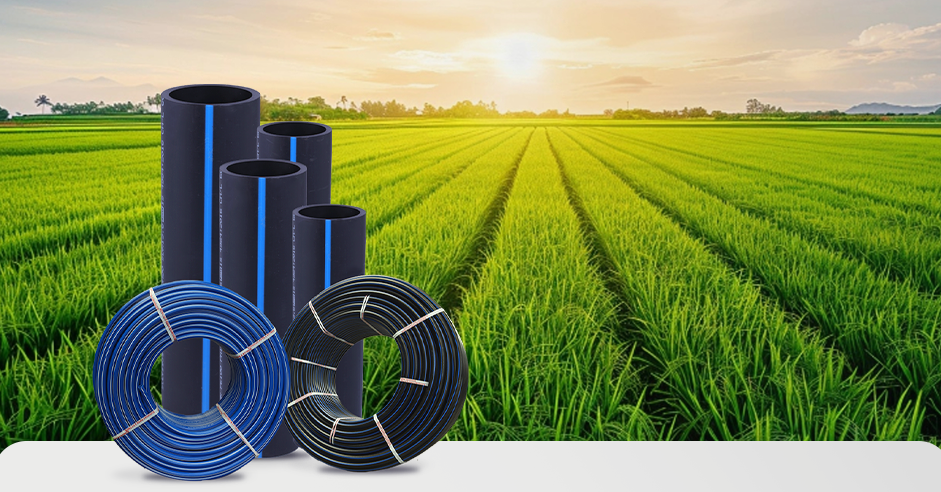Comprehending the Key Conveniences of HDPE Pipeline for Water and Wastewater Management
Using HDPE pipeline in water and wastewater monitoring provides many advantages that warrant factor to consider. Its remarkable durability and long life-span make it a preferred selection for several jobs. In addition, the material's resistance to rust and chemical damages boosts its reliability in various atmospheres. Nonetheless, the advantages expand beyond just longevity and resistance. Exploring its cost-effectiveness and ecological influence exposes much more compelling reasons for its extensive adoption in contemporary infrastructure
Remarkable Sturdiness and Durability

HDPE pipe stands apart for its phenomenal durability and durability, making it a favored choice in water management systems. Created from high-density polyethylene, these pipelines can endure considerable stress and anxiety, making certain reliable performance in time. Their durable nature permits them to sustain severe ecological problems, consisting of temperature changes and dirt movements, which can trigger various other materials to fail.
The life-span of HDPE pipelines frequently exceeds half a century, supplying a cost-efficient solution for communities and markets alike. Additionally, the product's lightweight residential or commercial properties streamline setup, decreasing labor costs and durations. This durability decreases the demand for constant fixings or substitutes, better enhancing its economic allure.
In water management applications, the dependability of HDPE pipes indicates fewer disruptions and enhanced solution continuity, making them important to lasting facilities development. The mix of durability and durability strengthens HDPE's role as a cornerstone in reliable water monitoring options.

Resistance to Rust and Chemical Damages
While many materials surrender to deterioration and chemical damages gradually, HDPE pipelines display impressive resistance, making them optimal for numerous water management applications. This strength stems from the molecular framework of high-density polyethylene, which is naturally non-reactive and does not corrode like metals or break down from direct exposure to severe chemicals. Consequently, HDPE is extremely reliable in settings with aggressive materials, such as wastewater systems that might consist of acids, bases, and organic solvents.
In addition, HDPE pipes can hold up against environmental elements such as soil acidity and saline conditions, additionally boosting their viability for varied applications (hdpe pipe suppliers Midland TX). Their ability to keep structural integrity over time lowers the risk of leaks and failures, which is vital in making certain the safety and security and integrity of water circulation and wastewater management systems. Subsequently, the resistance to corrosion and chemical damage significantly adds to the general effectiveness and long life of HDPE piping options
Cost-Effectiveness and Financial Benefits
When thinking about the monetary implications of water administration systems, the cost-effectiveness of HDPE pipes becomes obvious. These pipes use lower installment and maintenance costs compared to conventional products like metal or concrete. Their lightweight nature streamlines transportation and setup, resulting in minimized labor expenditures. In addition, HDPE pipelines exhibit a lengthy life expectancy, usually going beyond half a century, which equates to less replacements and lasting financial savings.
In addition, the resistance of HDPE to rust and chemical damages lessens the demand for expensive repair services and substitutes. The pipelines additionally sustain reliable water circulation, reducing energy expenses associated with pumping systems. By reducing best site leakages and water loss, HDPE pipelines add to significant economic benefits for districts and industries alike. On the whole, the initial investment in HDPE piping can yield considerable financial returns over the life-span of the water management system, making it a sensible option for sustainable framework advancement.
Ecological Sustainability and Lowered Effect

Versatility and Flexibility in Setup
Due to their unique homes, HDPE pipelines supply impressive flexibility and versatility in installment, making them appropriate for a vast array of applications. Their light-weight nature permits for easier handling and transportation, lowering labor prices and setup time. HDPE pipelines can be curved and formed to fit various surfaces and job demands, which is particularly advantageous in challenging settings.
In addition, their resistance to corrosion and chemical damage allows for setup in varied settings without the demand for specialized safety finishes. The capability read review to fuse joints produces a continual, leak-free system, boosting the general stability and integrity of the installation. HDPE's flexibility likewise accommodates ground movement, lowering the risk of damages in locations prone to shifting soil. On the whole, these qualities make HDPE pipes not just versatile yet also a preferred choice for water and wastewater monitoring systems.
Often Asked Concerns
How Does HDPE Pipe Compare to PVC in Water Administration Applications?
HDPE pipeline provides remarkable flexibility, resistance to rust, and sturdiness compared to PVC. Its lighter weight helps with easier installment, while its long life-span minimizes substitute expenses, making HDPE a favored choice in water management applications.
What Is the Life-span of HDPE Water Lines Under Common Problems?
Under regular problems, HDPE pipes can have a life expectancy ranging from 50 to 100 years. Their longevity and resistance to deterioration add to their lasting performance in various applications, making them a reliable selection for facilities.
Are HDPE Piping Recyclable After Their Life Span?
Yes, HDPE pipes are recyclable after their solution life. Texas hdpe pipe manufacturer. They can be processed and repurposed right into new products, greatly reducing ecological effect and promoting sustainability within the industry, making them a green option for piping services
What Is the Installation Process for HDPE Pipes?
The installation procedure for HDPE pipelines involves site prep work, trenching, pipe combination or mechanical signing up with, backfilling, and pressure screening. Correct strategies guarantee a long lasting and effective system for moving water and wastewater properly.
Can HDPE Water Lines Be Utilized for Both Potable and Non-Potable Water Solutions?
Yes, HDPE pipes can be made use of for both safe and clean and non-potable water supply. Their versatility, durability, and resistance to deterioration make them suitable for various applications, guaranteeing safe and effective transport of water in different contexts.